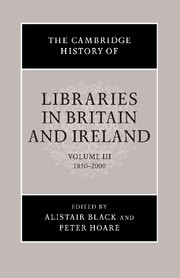Book contents
- Frontmatter
- Introduction: sources and methodologies for the history of libraries in the modern era
- 1 Libraries and the modern world
- Part One Enlightening the Masses: the Public Library as Concept and Reality
- Part Two The Voluntary Ethic: Libraries of our Own
- Part Three Libraries for National Needs: Library Provision in the Public Sphere in the Countries of the British Isles
- 15 Introduction: library provision in the countries of the British Isles
- 16 The library scene in an English city: Newcastle upon Tyne libraries 1850–2000
- 17 Public libraries in Wales since 1862
- 18 The National Library of Wales
- 19 The Scottish library scene
- 20 The National Library of Scotland
- 21 The Irish library scene
- 22 The National Library of Ireland
- Part Four The Nation's Treasury: Britain's National Library as Concept and Reality
- Part Five The Spirit of Enquiry: Higher Education and Libraries
- Part Six The Rise of Professional Society: Libraries for Specialist Areas
- Part Seven The Trade and its Tools: Librarians and Libraries in Action
- Part Eight Automation Pasts, Electronic Futures: the Digital Revolution
- Bibliography
- Index
- References
22 - The National Library of Ireland
from Part Three - Libraries for National Needs: Library Provision in the Public Sphere in the Countries of the British Isles
Published online by Cambridge University Press: 28 March 2008
- Frontmatter
- Introduction: sources and methodologies for the history of libraries in the modern era
- 1 Libraries and the modern world
- Part One Enlightening the Masses: the Public Library as Concept and Reality
- Part Two The Voluntary Ethic: Libraries of our Own
- Part Three Libraries for National Needs: Library Provision in the Public Sphere in the Countries of the British Isles
- 15 Introduction: library provision in the countries of the British Isles
- 16 The library scene in an English city: Newcastle upon Tyne libraries 1850–2000
- 17 Public libraries in Wales since 1862
- 18 The National Library of Wales
- 19 The Scottish library scene
- 20 The National Library of Scotland
- 21 The Irish library scene
- 22 The National Library of Ireland
- Part Four The Nation's Treasury: Britain's National Library as Concept and Reality
- Part Five The Spirit of Enquiry: Higher Education and Libraries
- Part Six The Rise of Professional Society: Libraries for Specialist Areas
- Part Seven The Trade and its Tools: Librarians and Libraries in Action
- Part Eight Automation Pasts, Electronic Futures: the Digital Revolution
- Bibliography
- Index
- References
Summary
The origins of the National Library of Ireland may be traced back to a private society. ‘The Dublin Society for improving husbandry, manufactures and other useful arts and sciences’ was founded in 1731. A royal charter was granted in 1749. The Royal Dublin Society, as it became, was concerned with improvement of the country in matters such as agriculture, manufactures and art. The government acknowledged the Society's usefulness by an annual grant. The use of public funds to help support a private institution was likely to lead to controversy. Membership applications were decided upon by ballot of the members, which included liberal and conservative elements. In 1835, Daniel Murray, Roman Catholic archbishop of Dublin, applied for membership; his application was contentiously rejected. This incident presented an opportunity to William Smith O'Brien, Conservative MP for the County of Limerick, who, in 1836, proposed to the House of Commons that a Committee be appointed ‘to inquire into the administration of the Royal Dublin Society, with a view to the wider extension of the advantage of the annual parliamentary grant to that institution, without reference to the distinctions of party or religion’. The Select Committee, under the chairmanship of Smith O'Brien, prepared a Report on the Society, which recommended that:
the Library of the Dublin Society ought to be considered as intended, not solely for the advantage of a comparatively few individuals who belong to the Society, but as a National Library, accessible under proper regulations to respectable persons of all classes, who may be desirous to avail themselves of it for the purpose of literary research.
- Type
- Chapter
- Information
- The Cambridge History of Libraries in Britain and Ireland , pp. 266 - 276Publisher: Cambridge University PressPrint publication year: 2006
References
- 1
- Cited by

